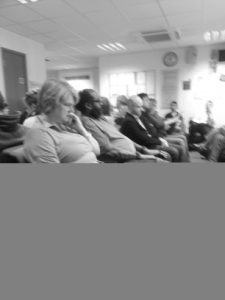This is the second in a series of four blog posts about my experience of being called for jury duty in 2013. If you haven’t already, you might like to read the first.
I started my jury service this week, trotting along to the Oxford Crown Court on Tuesday morning, after the long weekend. As I’ve previously described, I can’t tell you anything about any case that I was assigned to (for similar reasons, I’ve got fewer photos than I might have liked), but I can tell you about my experience of being a juror.

Getting into the courthouse is a little like getting through airport security: there’s a metal detector, and you have to turn over your bags to be searched. In my case, this took longer than most, becuase I’d brought with me a laptop computer, tablet computer, Kindle, textbooks, coursework, and paperwork relating to our efforts to buy a house (more on that, later), in addition to the usual keys, wallet, mobile phone, change, cycle helmet, gloves, etc. The metal detector seemed to be set to a rather under-enthusiastic sensitivity, though: it didn’t pick up on my metal belt buckle. Beyond this, I checked-in with reception, presenting my juror papers and driver’s license in order to prove my identity, before being ushered into a lift up to the jury assembly area.

The jury assembly area is a comfortable but unexciting lounge, with chairs, tables, a handful of magazines, books, and jigsaws, a television (at a low volume), vending machines, lockers, and nearby toilets. Well-prepared for a wait, I started setting myself up a remote office, tethering myself an Internet connection and monopolising a bank of electrical sockets. After a while, a jury officer appeared and took a register, amid mutters from some of the other potential jurors that it was “like being at school”.

There was some confusion about whether some of the potential jurors were supposed to be here at all (or had finished their service in the previous week), and about whether some others who were supposed to be present had arrived at all (and were perhaps hiding in the toilet or had disappeared down the corridor to the hot drinks dispenser), and the official had to excuse herself for a while to sort everything out. This gave us another extended period of sitting around doing nothing, which I quickly came to discover is an integral part of the experience of being a juror. Eventually, though, she returned and played for us a (slightly patronising) DVD, explaining our duties as jurors, before describing to us the process of selection and panelling, claiming expenses, and so on, and answering questions from the potential jurors present.

A random selection done somewhere behind the scenes had apparently resulted in my being assigned to a case that afternoon, which I hung around for. But for some reason, that case never happened – it just got cancelled, and I got sent home. Later – in accordance with my instructions pack – I phoned a special answerphone line I’d been given and listened, in a numbers station-like way, for my juror number to be called for the following day. It came up, with an instruction that I’d been selected for a case starting the following morning. There was still every chance that I might not actually be selected for the jury, owing to the complicated multi-step randomisation process (as well as the usual factors that I could be disqualified by knowing somebody involved with the case, or the case not being heard that day at all), but this was still an exciting step forwards after spending most of a day sat in a waiting room for nothing to happen.
But that can wait for the next blog post in the series.